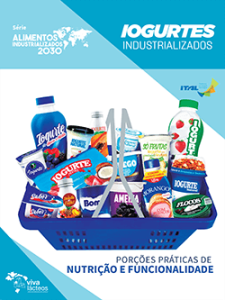CONSUMPTION TRENDS OF INDUSTRIALIZED YOGURT
Industrialized yogurt has become a widely appreciated meal globally. The yogurt popularity can be attributed to the consumers recognition of its efficacy and benefits to the health. A global research highlighted, among other factors considered for the yogurt daily consumption, the perception of a healthy, rich in proteins and calcium product, good for still-growing young people, convenient for quick snacks and to complement meals of very busy families on a daily basis. Indeed, many studies identified that yogurt consumers have a higher intake of nutrients and tend to have healthier dietary habits than non-consumers
The study Brasil Dairy Trends 2020 identified six consumption macrotrends that determine the main innovation in industrialized milky product. In addition to the Premium products and Sensory experience (products that claim for premium and gourmet, fresh, artisanal manufacturing, with different flavors), related to aspects widely appreciated by consumers, the other corresponds to the demands for products with benefits associated to nutrition, health, and well-being: Nutritional Density and Convenience (products fortified with nutrients or added with fruits, cereals, cocoa, etc.), Digestibility and Well-being (milky products with probiotic, prebiotic ingredients and fibers), Functionality and Prevention (milky produtos with protein, peptide and bioactive ingredient, etc.), Control and Adequacy (reformulated milky products, with lower content or even with total replacement of sodium, fats, and sugar), and Sustainability and Naturalness (information about the origin o products, composition, manufacturing stages and authenticity).
PREMIUM PRODUCTS and SENSORY EXPERIENCE
 Generally, flavor is very demanded factor in all types of yogurt. The PREMIUM PRODUCTS and SENSORY EXPERIENCE macrotrend has motivated the development of “…products with premium e gourmet claims, the valuation of freshness, artisanal manufacturing of products prepared with non cow milk […].” Also, “another movement associated to premium products is the desire to consume products that provide a sophisticated, exotic, and innovating sensory experiences […].” This trend results in the emergence of “…products with different flavors and unprecedented flavors to consumer”.
Generally, flavor is very demanded factor in all types of yogurt. The PREMIUM PRODUCTS and SENSORY EXPERIENCE macrotrend has motivated the development of “…products with premium e gourmet claims, the valuation of freshness, artisanal manufacturing of products prepared with non cow milk […].” Also, “another movement associated to premium products is the desire to consume products that provide a sophisticated, exotic, and innovating sensory experiences […].” This trend results in the emergence of “…products with different flavors and unprecedented flavors to consumer”.
NUTRITIONAL DENSITY AND CONVENIENCE
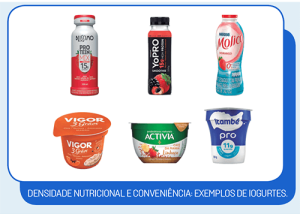 Many industrialized yogurts have been developed according to the NUTRITIONAL DENSITY AND CONVENIENCE trend to meet consumers “… who increasingly are demanding for nutritive options to compose the daily diet”. Milky products, such as yogurt, traditionally known by its natural enrichment in essential nutrients, has also met this demand for products fortified with nutrients or added with fruits, cereals, cocoa, etc.
Many industrialized yogurts have been developed according to the NUTRITIONAL DENSITY AND CONVENIENCE trend to meet consumers “… who increasingly are demanding for nutritive options to compose the daily diet”. Milky products, such as yogurt, traditionally known by its natural enrichment in essential nutrients, has also met this demand for products fortified with nutrients or added with fruits, cereals, cocoa, etc.
DIGESTIBILITY and WELL-BEING
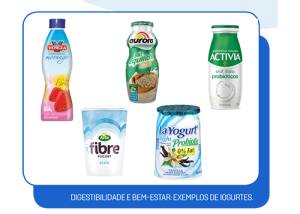 Yogurts designed to the DIGESTIBILITY AND WELL-BEING, meet the “demand for products with different functionalities for the health […]”, being identified, even without having their ingredients stated in the label, as allied to the digestion processes. “In the last years, milky products with probiotic, prebiotic ingredients and fibers have been valued due to their benefits to health, among them we highlight the digestive system regulation and the body balance as a whole, which causes a well-being feeling”.
Yogurts designed to the DIGESTIBILITY AND WELL-BEING, meet the “demand for products with different functionalities for the health […]”, being identified, even without having their ingredients stated in the label, as allied to the digestion processes. “In the last years, milky products with probiotic, prebiotic ingredients and fibers have been valued due to their benefits to health, among them we highlight the digestive system regulation and the body balance as a whole, which causes a well-being feeling”.
FUNCTIONALITY and PREVENTION
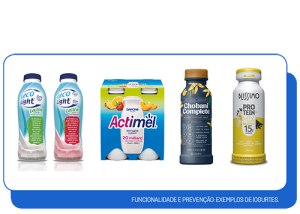 Yogurts aligned to the FUNCTIONALITY AND PREVENTION are formulated in order to offer “in addition to the functionalities provided by the milky products with probiotic, prebiotic and symbiotic ingredients, […] many other benefits to the health, with application of protein ingredient, bioactive peptides, etc.”
Yogurts aligned to the FUNCTIONALITY AND PREVENTION are formulated in order to offer “in addition to the functionalities provided by the milky products with probiotic, prebiotic and symbiotic ingredients, […] many other benefits to the health, with application of protein ingredient, bioactive peptides, etc.”
SUSTAINABILITY AND NATURALNESS
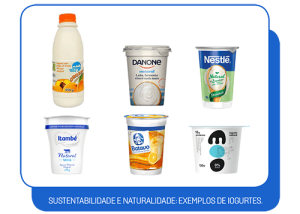 Yogurts related to SUSTAINABILITY AND NATURALNESS macrotrend face a scenario in which consumers are more aware in relation to products origin, composition, manufacturing stages, and authenticity. “As a consequence, the requirements for the companies to be more transparent and responsible with the information and customers education increase. That behavior partially explains the growth of the naturalness trend, that is, the demand for products seen as safer and healthier by the consumers”.
Yogurts related to SUSTAINABILITY AND NATURALNESS macrotrend face a scenario in which consumers are more aware in relation to products origin, composition, manufacturing stages, and authenticity. “As a consequence, the requirements for the companies to be more transparent and responsible with the information and customers education increase. That behavior partially explains the growth of the naturalness trend, that is, the demand for products seen as safer and healthier by the consumers”.
CONTROL and ADEQUACY
undefined
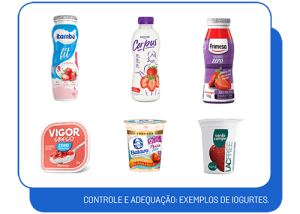 A strong influence of the CONTROL AND ADEQUACY macrotrend “..has led the consumers to opt for products with lower sodium, fats, and sugar content, such as the desire to balance better the daily food, control the weight and blood pressure and prevent diseases, in addition to public policies with programs aiming the reduction of these ingredients intake. The results are the increasing offer of reformulated milky products, with lower content or even the total replacement of sodium, fat and sugar. […] The consumer rejection still extends to other ingredients, such as lactose in milky products.
A strong influence of the CONTROL AND ADEQUACY macrotrend “..has led the consumers to opt for products with lower sodium, fats, and sugar content, such as the desire to balance better the daily food, control the weight and blood pressure and prevent diseases, in addition to public policies with programs aiming the reduction of these ingredients intake. The results are the increasing offer of reformulated milky products, with lower content or even the total replacement of sodium, fat and sugar. […] The consumer rejection still extends to other ingredients, such as lactose in milky products.



